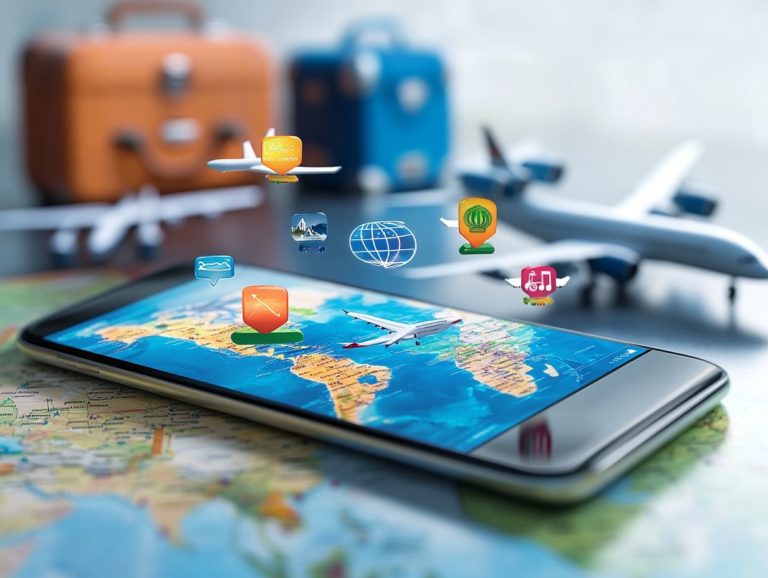Cultural Etiquette: What Not to Do While Traveling
Traveling opens doors to thrilling adventures! Yet, it comes with its own set of rules and expectations, often referred to as cultural etiquette.
Understanding local customs can make or break your journey don t miss out! This guide delves into essential concepts of cultural etiquette, points out common missteps to steer clear of, and offers valuable resources for your research.
By mastering the art of respecting local customs and skillfully handling potential misunderstandings, you can elevate your travel experience and forge deeper connections with the destinations you explore.
Contents
- Key Takeaways:
- Understanding Cultural Etiquette
- Common Mistakes to Avoid While Traveling
- Researching Cultural Etiquette Before Traveling
- Practicing Respect and Sensitivity
- Handling Cultural Misunderstandings
- Frequently Asked Questions
- What is cultural etiquette and why is it important while traveling?
- What are some common mistakes to avoid while practicing cultural etiquette?
- Is it necessary to research cultural etiquette before traveling to a new destination?
- What are some general tips for practicing cultural etiquette while traveling?
- What are some specific cultural etiquette rules to keep in mind while visiting religious sites?
- What should I do if I accidentally offend someone while practicing cultural etiquette?
Key Takeaways:

- Respect and sensitivity are key when traveling. Avoid offending locals by researching cultural etiquette beforehand.
- Body language and social norms vary across cultures. Be mindful of your actions and avoid offensive gestures.
- When faced with a cultural misunderstanding, apologize and make amends. Practicing cultural etiquette shows respect and fosters positive interactions with locals.
Understanding Cultural Etiquette
Understanding cultural etiquette is crucial for you as a traveler aiming to navigate social situations with grace and sensitivity. Cultural etiquette includes the local customs, appropriate behaviors, and social norms that shape interactions across various cultures think Japan, Germany, Italy, Spain, France, and Korea.
By mastering these unspoken rules, you not only elevate your travel experience but also cultivate meaningful relationships with the locals. This enriches your cultural understanding and appreciation in the process.
What is Cultural Etiquette?
Cultural etiquette encompasses the accepted standards of behavior within a specific culture, including the interaction techniques and appropriate behaviors expected in various social situations. Understanding these nuances enhances your travel experience and cultivates a deeper connection with local communities.
For instance, greetings can differ dramatically across cultures, ranging from firm handshakes to gentle bows, each carrying its own message of respect and acknowledgment. Your choice of attire can also reflect your appreciation for local customs tourist clothing might unintentionally come off as offensive.
Dining situations present unique norms; knowing whether to wait for the host to begin or how to properly handle chopsticks can be crucial. This awareness fosters patience and kindness, essential traits that help bridge cultural gaps and create meaningful interactions with locals.
Common Mistakes to Avoid While Traveling
Travelers frequently find themselves in precarious situations, often unaware of the local customs and social norms. This lack of understanding can lead to inadvertent gestures or actions that might be offensive, crossing lines that could alienate the very people they seek to connect with.
Offensive Gestures and Actions
Certain gestures and actions that seem harmless to you might be deeply offensive in another culture. Take the thumbs-up, for example while it signals approval in many Western cultures, in parts of the Middle East, it can be seen as an insult. Likewise, pointing at someone with your finger is considered quite rude in various Asian countries.
Maintaining eye contact may convey trust in some societies, but in others, it could be interpreted as a challenge or even disrespectful. To avoid inadvertently offending locals, research specific cultural norms around body language and gestures before you set off on your journey. Engaging with local customs and practicing mindful communication can significantly enhance your travel experience while minimizing the risk of misunderstandings.
Taboos and Social Norms

Taboos and social norms vary significantly across cultures, making it essential for you to familiarize yourself with these customs and traditions to avoid potential mistakes.
Understanding these cultural differences can profoundly enhance your travel experience and help you forge deeper connections with local communities. For instance, in some cultures, discussing personal topics during meals may be deemed inappropriate. In others, such open dialogue is warmly embraced.
Certain behaviors are expected at religious sites, where silence and reverence are important. Being aware of these etiquettes not only demonstrates respect but also reduces the risk of unintentional disrespect, paving the way for a richer, more immersive journey into the heart of diverse cultures.
Researching Cultural Etiquette Before Traveling
Researching cultural etiquette before you embark on your travels is a crucial step that can significantly enhance your overall experience and shape your interactions with the local population.
Resources for Learning about Different Cultures
You’re about to unlock the secrets of diverse cultures! Numerous resources await you, designed for travelers eager to explore diverse cultures and deepen their understanding of cultural etiquette.
Travel guides such as Lonely Planet and platforms like Culture Trip offer invaluable insights into customs and social norms across various destinations. Social media channels like Instagram and TikTok showcase engaging content from travelers who share their personal experiences, making cultural exploration both accessible and captivating.
Get ready to take your communication skills to the next level! Language learning apps like Drops provide practical tools to help you break down language barriers. With their visual and interactive techniques, these apps enable you to quickly grasp essential phrases, enriching your journeys and fostering authentic connections with locals.
Practicing Respect and Sensitivity
Practicing respect and sensitivity is essential for fostering successful interactions during your travels. It reflects a genuine appreciation for the local culture and honors the people you encounter along the way.
Tips for Interacting with Locals
To truly foster meaningful connections with locals, equip yourself with practical tips that enhance your interactions and promote cultural understanding.
One effective strategy is to learn a few basic phrases in the local language. This not only aids communication but also demonstrates your respect for the community’s culture. Showing genuine curiosity about local customs like asking about traditional food or festivals can spark engaging conversations, paving the way for deeper connections.
Respecting cultural norms, such as dressing appropriately when visiting sacred sites or understanding dining etiquette the customs followed during meals in different cultures can significantly enrich your travel experience. By being open-minded and approachable, you ll encourage locals to share their stories and traditions, making every interaction one to remember.
Adapting to Different Customs and Traditions

Adapting to different customs and traditions is essential for you as a traveler who seeks to fully immerse yourself in the local culture and elevate your travel experience.
By observing local behaviors and practices, you will gain a deep understanding of what is considered respectful and appropriate in various contexts. For instance, in Japan, bowing is a customary greeting that signifies respect, so it’s important for you to pay attention to this social cue and participate accordingly.
In Italy, savoring meals often involves a leisurely pace and embracing the communal spirit of dining. You might notice the significance of phrases like ‘buon appetito’ before indulging in a meal, which can help you forge connections with locals.
Meanwhile, in Spain, engaging in the evening tradition of tapas creates memorable experiences as you learn to relish both the food and the conversations. Don t underestimate the power of asking questions; it demonstrates your interest and openness to the culture, paving the way for deeper interactions.
Handling Cultural Misunderstandings
Navigating cultural misunderstandings with grace can transform potentially awkward moments into valuable learning experiences. This highlights your openness to embracing diverse cultural norms.
How to Apologize and Make Amends
When you encounter a cultural misunderstanding, knowing how to apologize is crucial for demonstrating respect and restoring goodwill.
Making a sincere apology can vary significantly across cultures. It s not just about the words you choose but also the small differences in body language, tone, and context.
For example, in Japan, bowing plays a vital role in an apology. The depth and duration of the bow reflect the sincerity and seriousness of your regret. In contrast, in the United States, maintaining eye contact during an apology typically signals honesty and earnestness.
Recognizing these cultural nuances enhances your communication skills. You ll build deeper connections and mutual understanding by respecting local customs. Effectively express your remorse while honoring the diverse ways in which people value respect and reconciliation.
Watch this video for more insights on handling cultural misunderstandings!
Frequently Asked Questions
-
What is cultural etiquette and why is it important while traveling?
Cultural etiquette refers to the customs, behaviors, and social norms of a specific culture. It s crucial to be aware of cultural etiquette while traveling to show respect and avoid offending locals.
-
What are some common mistakes to avoid while practicing cultural etiquette?
Some common mistakes include not learning basic greetings in the local language, wearing inappropriate clothing, and not following proper dining etiquette. To avoid these pitfalls, consider understanding cultural differences when traveling.
-
Is it necessary to research cultural etiquette before traveling to a new destination?
Yes, it s essential to do some research on the cultural norms and customs of the country you are visiting. This helps avoid misunderstandings or unintentional offenses.
-
What are some general tips for practicing cultural etiquette while traveling?
Discover amazing insights by observing and mimicking local customs! Other tips include being aware of body language and asking for permission before taking photos of people or religious sites.
-
What are some specific cultural etiquette rules to keep in mind while visiting religious sites?
Dress modestly to show respect, remove shoes before entering, and follow any guidelines or restrictions set by the site or religious leaders.
-
What should I do if I accidentally offend someone while practicing cultural etiquette?
If you realize you ve made a mistake, apologize sincerely and try to correct your behavior. Most locals will appreciate your effort and understanding of their cultural norms.





